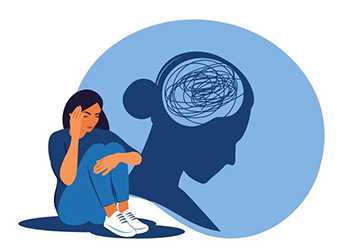When to Consider Mental Health Therapy
Psychological equanimity is a cardinal facet of holistic health. Discerning the propitious juncture to contemplate mental health therapy can markedly ameliorate one's existential quality. This exposition will elucidate the benefits of mental health therapy, delineate the variegated types of mental health therapy, and proffer perspicacious guidance on finding a mental health therapist.
Psychological equanimity is a cardinal facet of holistic health. Discerning the propitious juncture to contemplate mental health therapy can markedly ameliorate one's existential quality. This exposition will elucidate the benefits of mental health therapy, delineate the variegated types of mental health therapy, and proffer perspicacious guidance on finding a mental health therapist.

Understanding the Benefits of Mental Health Therapy
Mental health therapy benefits abound and can substantially influence disparate life domains. Herein are some pivotal mental health therapy benefits:
- Augmented emotional regulation: Therapy facilitates individuals in comprehending and modulating their affective states with greater efficacy.
- Enhanced coping stratagems: It bequeaths individuals with instruments to mitigate stress, anxiety, and melancholy.
- Increased self-cognisance: Therapy fosters introspection, culminating in heightened self-comprehension.
- Ameliorated interpersonal relationships: It can amplify communicative dexterity and relational understanding.
- Personal evolution: Therapy engenders personal metamorphosis and edification.
Recognising the Need for Mental Health Therapy
Comprehending when to solicit mental health therapy is paramount. Here are some indices that might be apposite to contemplate therapy:
- Persistent feelings of despair or hopelessness.
- Exorbitant worry, trepidation, or anxiety.
- Difficulty managing quotidian obligations and responsibilities.
- Alterations in sleep or dietary patterns.
- Substance abuse or dependency issues.
Exploring Types of Mental Health Therapy
A plethora of types of mental health therapy exists, each meticulously designed to address specific difficulties. Here are some preeminent types:
Cognitive Behavioral Therapy (CBT)
Cognitive Behavioral Therapy (CBT) concentrates on identifying and transmuting deleterious thought paradigms that impinge upon comportment and emotions. It is efficacious in treating depression, anxiety, and sundry mental health disorders.
Psychodynamic Therapy
Psychodynamic therapy delves into unconscious processes and antecedent experiences to fathom current comportment and emotions. It is promising for those grappling with unresolved antecedent issues.
Humanistic Therapy
Humanistic therapy accentuates self-actualisation and ontological growth. It centres on the individual's potentiality and underscores the significance of self-exploration and personal improvement.
Group Therapy
Group therapy entails multiple participants deliberating on their issues in a collective setting under the aegis of a therapist. It proffers peer support and helps individuals realise they are not solitary in their tribulations.
Family Therapy
Family therapy addresses intrafamilial issues. It aids in ameliorating communication, resolving conflicts, and fortifying familial bonds.
Finding a Mental Health Therapist
Securing the appropriate therapist is indispensable for efficacious treatment. Here are some sensible tips for finding a mental health therapist:
- Research and referrals: Seek recommendations from confidants, family, or healthcare providers.
- Credentials and experience: Ensure the therapist is credentialed and experienced in treating your issues.
- Compatibility: It is imperative to feel comfortable and comprehended by your therapist.
- Specialisations: Seek therapists who specialise in therapy that aligns with your needs.
Benefits of Long-Term Mental Health Therapy
Protracted therapy can proffer sustained mental health therapy benefits:
- Ongoing personal growth: Regular therapy sessions catalyse continuous self-betterment.
- Profound understanding of issues: Long-term therapy permits a more profound exploration of underlying issues.
- Enhanced coping mechanisms: It fortifies and develops superior coping stratagems over time.
- Consistent support: A protracted therapeutic relationship provides unwavering support and guidance.
Common Misconceptions About Mental Health Therapy
There are several misconceptions about mental health therapy that can prevent individuals from seeking help. Here are some prevalent myths debunked:

- "Therapy is solely for severe mental illness." Therapy can benefit anyone, irrespective of the severity of their issues.
- "Therapists merely listen and proffer no solutions." Therapists provide pragmatic stratagems and instruments to address problems.
"Therapy is prohibitively expensive." However, there are affordable options, including sliding-scale fees and community resources.
How to Make the Most Out of Mental Health Therapy
To maximise the mental health therapy benefits, consider the following tips:
- Be candid and veracious: Sharing genuine thoughts and feelings is crucial for effective therapy.
- Set objectives: Having lucid goals can help you monitor progress and remain motivated.
- Practice exogenous application: Applying what you learn in therapy to your quotidian life enhances its efficacy.
When to Reassess Your Therapy Needs
Occasionally, it may be necessary to reassess your therapy needs. Here are some signs it might be propitious to make alterations:
- Lack of progress: If you don’t discern any improvement, it might be time to experiment with a different approach or therapist.
- Feeling stagnated: Feeling like you're not advancing can indicate the need for a novel strategy.
- Change in issues: New or disparate problems may necessitate a different type of therapy or specialist.
Advanced Strategies for Enhancing Mental Health Therapy Benefits
Incorporating advanced strategies can be pivotal to leveraging mental health therapy's benefits. Here are some sophisticated approaches:
Integrative Therapy Techniques
Integrative therapy amalgamates various therapeutic methods to tailor a sui generis treatment plan for the individual. This holistic approach ensures that multiple facets of the person's mental health are addressed simultaneously.
- Interdisciplinary Techniques: Synthesising cognitive-behavioral therapy with mindfulness and somatic experiencing.
- Tailored Interventions: Customising therapy sessions based on ongoing assessments and progress.
Utilising Technology in Mental Health Therapy
Modern advancements have introduced avant-garde ways to enhance therapy through technology, augmenting the traditional therapeutic approaches.
- Teletherapy: Virtual sessions enable access to therapy irrespective of geographical constraints.
- Therapeutic Apps: Utilising apps that offer tools for managing anxiety, depression, and stress between sessions.
-Monitoring physiological responses to stress and emotions can provide therapists with real-time data.
Exploring Less Conventional Types of Mental Health Therapy
Beyond the well-known types of mental health therapy, several unconventional methods have shown efficacy in specific contexts.
Art Therapy
Art therapy leverages creative expression as a therapeutic technique to help individuals explore emotions, develop self-awareness, and cope with stress.
- Creative Expression: Employing art as a medium to process complex emotions.
- Non-verbal Communication: Facilitating expression when verbal articulation is challenging.
Ecotherapy
Ecotherapy, or nature therapy, involves immersing individuals in natural settings to promote mental health.
- Nature Immersion: Utilising outdoor environments to alleviate stress and enhance mood.
- Environmental Engagement: Activities like gardening or hiking that foster a connection with nature.
Conclusion
Recognising when to contemplate mental health therapy and understanding the variegated types of mental health therapy can lead to significant ameliorations in your life. The manifold benefits of mental health therapy and securing the right therapist are indispensable for efficacious treatment. By debunking common misconceptions and maximising the benefits of therapy, you can achieve enhanced emotional regulation, coping strategies, and personal growth. Regularly reassessing your therapy needs ensures you continue receiving optimal care. Prioritising mental health is crucial for overall well-being and a fulfilling life.